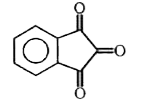Which of the following does not form M^(+3)?
A)B
B)AI
C)Ga
D)In
The correct Answer is:A
To determine which of the following metals does not form M^(+3) ions among boron (B), aluminum (Al), gallium (Ga), and indium (In), we can analyze the ionization energies and electronic configurations of these elements.
1. Identify the Metals: The metals in question are boron (B), aluminum (Al), gallium (Ga), and indium (In).
2. Understand Ionization Energies: Ionization energy is the energy required to remove an electron from an atom. For an element to form a +3 oxidation state (M^(+3)), it must be able to remove three electrons relatively easily.
3. Examine Boron (B):
- Atomic Number: 5
- Electronic Configuration: 1s² 2s² 2p¹
- To form B^(+3), three electrons must be removed. The first two electrons are removed from the 2s and 2p orbitals, and the third electron must be removed from the 1s orbital, which requires a significant amount of energy because the 1s orbital is very stable.
- Conclusion: The third ionization energy for boron is extremely high, making it difficult for boron to form B^(+3).
4. Examine Aluminum (Al):
- Atomic Number: 13
- Electronic Configuration: (Ne) 3s² 3p¹
- Aluminum can easily lose three electrons to form Al^(+3) because the removal of these electrons does not involve breaking into a filled inner shell.
5. Examine Gallium (Ga):
- Atomic Number: 31
- Electronic Configuration: (Ar) 3d¹⁰ 4s² 4p¹
- Gallium can also lose three electrons to form Ga^(+3) with relatively lower ionization energy compared to boron.
6. Examine Indium (In):
- Atomic Number: 49
- Electronic Configuration: (Kr) 4d¹⁰ 5s² 5p¹
- Similar to aluminum and gallium, indium can lose three electrons to form In^(+3).
7. Final Conclusion: Among the given options, boron (B) does not form M^(+3) ions due to its high ionization energy required to remove three electrons.
Answer: Boron (B) does not form M^(+3).
- Atomic Number: 5
- Electronic Configuration: 1s² 2s² 2p¹
- To form B^(+3), three electrons must be removed. The first two electrons are removed from the 2s and 2p orbitals, and the third electron must be removed from the 1s orbital, which requires a significant amount of energy because the 1s orbital is very stable.
- Conclusion: The third ionization energy for boron is extremely high, making it difficult for boron to form B^(+3).
- Atomic Number: 13
- Electronic Configuration: (Ne) 3s² 3p¹
- Aluminum can easily lose three electrons to form Al^(+3) because the removal of these electrons does not involve breaking into a filled inner shell.
- Atomic Number: 31
- Electronic Configuration: (Ar) 3d¹⁰ 4s² 4p¹
- Gallium can also lose three electrons to form Ga^(+3) with relatively lower ionization energy compared to boron.
- Atomic Number: 49
- Electronic Configuration: (Kr) 4d¹⁰ 5s² 5p¹
- Similar to aluminum and gallium, indium can lose three electrons to form In^(+3).
Topper's Solved these Questions
- SOME P-BLOCK ELEMENTS BOOK - ICSECHAPTER - SOME P-BLOCK ELEMENTS EXERCISE - TRUE OR FALSE TYPE QUESTION
19 Videos
- SOME P-BLOCK ELEMENTS BOOK - ICSECHAPTER - SOME P-BLOCK ELEMENTS EXERCISE - FILL IN THE BLANKS TYPE QUESTIONS
22 Videos
- SOME P-BLOCK ELEMENTS BOOK - ICSECHAPTER - SOME P-BLOCK ELEMENTS EXERCISE - ESSAY (LONG ANSWER) TYPE QUESTION
36 Videos
- SOME BASIC CONCEPTS OF CHEMISTRY BOOK - ICSECHAPTER - SOME BASIC CONCEPTS OF CHEMISTRY EXERCISE - NCERT TEXT-BOOK EXERCISES (WITH HINGS AND SOLUTIONS)
36 Videos
- STATES OF MATTER : GASES AND LIQUIDSBOOK - ICSECHAPTER - STATES OF MATTER : GASES AND LIQUIDSEXERCISE - NCERT TEXT-BOOK EXERCISES (With Hints and Solutions)
23 Videos
Similar Questions
Knowledge Check
Which of the following does not form during glycolysis?
ANADHBATPCPyruvateDFADH2Which of the following does not form a stable hydrate on addition of H2O ?
A B
B C
C D
D
Which of the following does not match?
View SolutionWhich of the following does not form alums?
View SolutionWhich of the following does not exist
View SolutionWhich of the following does not exist ?
View SolutionWhich of the following does not exist ?
View SolutionWhich of the following does not exist ?
View Solution
